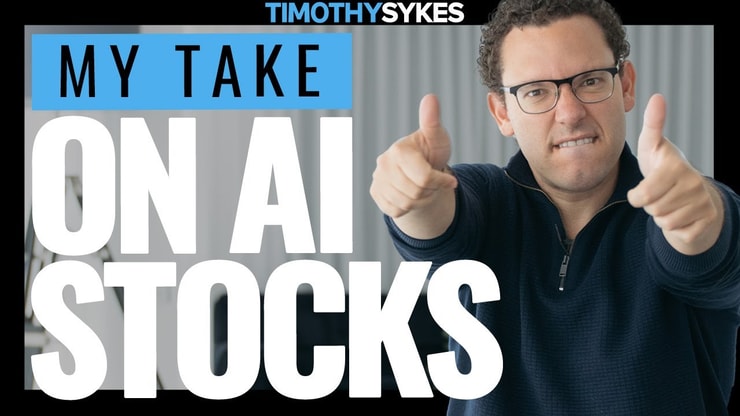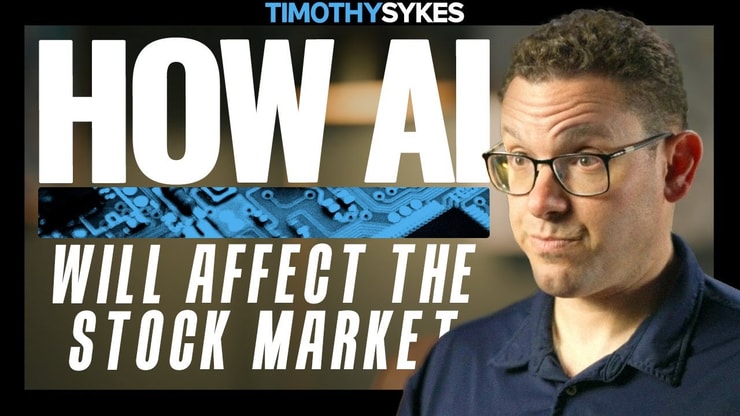AI ETFs in Canada are investment vehicles that focus on the technology sector, specifically in companies that specialize in artificial intelligence. These ETFs offer a way for traders to diversify their portfolios, mitigate risk, and tap into the booming AI industry without having to pick individual stocks. Just like how I’ve made gains trading penny stocks by understanding patterns and trends, you can make informed decisions in the AI sector.
Read this article because it provides a comprehensive guide to investing in Canadian AI ETFs, covering everything from the significance of AI in the Canadian landscape to specific ETF picks for 2024.
I’ll answer the following questions:
- What is a Canadian AI ETF?
- Why is AI significant in the Canadian investment landscape?
- How is AI impacting investments and economic growth?
- What benefits do AI ETFs offer to investors?
- What are some top AI ETFs available in Canada for 2024?
- What factors should you consider when investing in AI ETFs?
- How can you start investing in AI ETFs in Canada?
- What are the future prospects and challenges of investing in AI ETFs in Canada?
Still with me? Good. Now let’s dig into the details.
Table of Contents
- 1 What Is a Canadian AI ETF?
- 2 The Growth of AI and Its Impact on Investments
- 3 Top AI ETFs Available in Canada in 2024
- 3.1 Global X Artificial Intelligence & Technology ETF (NASDAQ: AIQ)
- 3.2 VanEck Robotics ETF (NASDAQ: IBOT)
- 3.3 First Trust Nasdaq Artificial Intelligence and Robotics ETF (NASDAQ: ROBT)
- 3.4 Defiance Quantum & AI ETF (NYSEARCA: QTUM)
- 3.5 Roundhill Generative AI & Technology ETF (NYSEARCA: CHAT)
- 3.6 Overview of Leading AI ETFs in Canada
- 3.7 Performance Analysis of Prominent AI ETFs
- 4 Factors to Consider When Investing in AI ETFs
- 5 How To Invest in AI ETFs in Canada
- 6 Future Prospects of AI ETFs in Canada
- 7 Key Takeaways
- 8 Frequently Asked Questions
What Is a Canadian AI ETF?
AI ETF Canada refers to exchange-traded funds that focus on companies involved in artificial intelligence (AI) technologies within the Canadian investment landscape. These specialized ETFs allow traders to diversify their portfolio by gaining exposure to multiple AI companies, both in software and hardware. As someone who teaches about the stock market and strategies to diversify your investments, I can attest to the relevance of AI ETFs in today’s trading world.
The Significance of AI in the Canadian Investment Landscape
AI is a burgeoning industry in Canada, home to some cutting-edge technology companies. As someone who’s navigated the stock market and helped others do the same, I can confirm that AI is not just a trend; it’s shaping the future. Investors who recognize this are often eager to include AI stocks in their portfolio. The ETF route can give them a chance to do so without putting all their eggs in one basket.
The Growth of AI and Its Impact on Investments

Artificial intelligence isn’t just a buzzword — it’s a driving force behind innovation and economic growth. Given its potential, it’s crucial to consider the AI sector in your investment strategy. From my years in teaching trading strategies, understanding industries like AI can be the difference between stagnant and dynamic investments.
Evolution of Artificial Intelligence in the Global Market
AI’s global influence can’t be overstated. It’s revolutionizing sectors from Wall Street to healthcare. It’s not just for tech companies; it’s becoming integral to businesses in every industry. This ubiquity means that investing in AI ETFs provides exposure to a diversified range of markets.
More Breaking News
- Morgan Stanley’s Bold Moves Boost Cipher Mining’s Prospects
- BigBear.ai Under Investigation: Stock Faces Turbulent Times
- Strategic Moves Propel CCH Holdings: Stock Soars
- Robinhood Appointed Trustee for Trump Accounts, Stock Rises
Benefits of Investing in AI ETFs
AI ETFs let you capitalize on the AI growth story without having to pick individual stocks, a practice I always emphasize in my trading teachings. They offer investors balanced risk by spreading their investment across various companies involved in data analytics, artificial intelligence, and learning technologies.
Top AI ETFs Available in Canada in 2024
My top AI ETF picks are:
- Global X Artificial Intelligence & Technology ETF (NASDAQ: AIQ)
- VanEck Robotics ETF (NASDAQ: IBOT)
- First Trust Nasdaq Artificial Intelligence and Robotics ETF (NASDAQ: ROBT)
- Defiance Quantum & AI ETF (NYSEARCA: QTUM)
- Roundhill Generative AI & Technology ETF (NYSEARCA: CHAT)
Don’t take my word for it—let the performance do the talking. From my trading experience, the metrics never lie. Here are some leading Canadian AI ETFs based on their returns and asset stability.
There’s no guarantee I’ll trade any of these stocks. I’m watching them to see if they match my preferred setups — only then will I trade them.
The best traders watch more than they trade — that’s what I’m trying to model here.
Sign up for my NO-COST watchlist here!
Global X Artificial Intelligence & Technology ETF (NASDAQ: AIQ)
My first Canadian AI ETF pick is Global X Artificial Intelligence & Technology ETF (NASDAQ: AIQ).
The Global X tracks the Indxx Artificial Intelligence and Big Data Index. It offers a diversified approach by including firms that are integrating AI into their existing business models.
AIQ focuses on developed-market equities in the artificial intelligence and big data sectors. Managed passively, its selection criteria include scrutinizing public filings, company statements, and other relevant data. This fund operates with a market-cap-weighted strategy, re-weighing semi-annually and reconstituting annually.
VanEck Robotics ETF (NASDAQ: IBOT)
My second Canadian AI ETF pick is VanEck Robotics ETF (NASDAQ: IBOT).
The VanEck Robotics ETF (NASDAQ: IBOT) holds about 85 stocks, with top holdings including NVIDIA Inc. (NASDAQ: NVDA), Emerson Electric (NYSE: EMR), and ABB Ltd (NYSE: ABB). It has an expense ratio of 0.47%. The fund focuses on industrial automation, non-industrial automation, and autonomous vehicles.
IBOT provides exposure to global companies pioneering in commercial and industrial robotics. The fund’s holdings are determined by the revenue companies generate from this specific theme. Following a modified market-cap weighting, IBOT is oriented towards sub-industries such as robotic surgical systems, 3D printing, and machine vision. The portfolio weighting leans 50% to robotics/manufacturing, with the remaining divided among other related fields. Rebalancing occurs semiannually.
First Trust Nasdaq Artificial Intelligence and Robotics ETF (NASDAQ: ROBT)
My third Canadian AI ETF pick is First Trust Nasdaq Artificial Intelligence and Robotics ETF (NASDAQ: ROBT).
The First Trust Nasdaq Artificial Intelligence and Robotics ETF (NASDAQ: ROBT) offers a blend of pioneering companies in AI and robotics. The ETF focuses on industry leaders.
ROBT employs the Consumer Technology Association’s system for its stock picks. Companies are categorized as enablers, engagers, or enhancers. Each category then receives a portfolio weight of 60%, 25%, and 15% respectively. The fund focuses on companies deeply involved in artificial intelligence or robotics, selecting the top 30 in each category. Rebalancing and reconstitution happen quarterly and semi-annually.
Defiance Quantum & AI ETF (NYSEARCA: QTUM)
My fourth Canadian AI ETF pick is Defiance Quantum & AI ETF (NYSEARCA: QTUM).
QTUM has top holdings that include Cirrus Logic (NASDAQ: CRUS) and Alteryx Inc. (NYSE: AYX). The ETF has an expense ratio of 0.40%.
QTUM tracks the BlueStar Quantum Computing and Machine Learning Index, covering around 71 global stocks in the field. This ETF gives traders access to companies excelling in quantum computing, machine learning, and cloud computing. The focus here is on transformative computing technologies across all market capitalizations.
Roundhill Generative AI & Technology ETF (NYSEARCA: CHAT)
My fifth Canadian AI ETF pick is Roundhill Generative AI & Technology ETF (NYSEARCA: CHAT).
The Roundhill Generative AI ETF focuses on next-gen AI technologies. The ETF invests in companies actively creating new AI technologies.
CHAT is targeted at companies involved in generative AI. The fund holds positions in software, cloud infrastructure, semiconductors, network infrastructure, and services. Nvidia, Microsoft, and Alphabet are among its major holdings, accounting for significant percentages in the portfolio. Nvidia’s chips power many AI solutions, while Microsoft collaborates with Nvidia on AI supercomputing projects. Alphabet is also heavily invested in AI technologies.
Overview of Leading AI ETFs in Canada
When I teach about trading, I emphasize understanding the market landscape. Each of these ETFs has its own unique focus, whether it’s software, hardware, or a mix of both. Know what you’re getting into.
Performance Analysis of Prominent AI ETFs
If you’ve followed my trading journey, you know I focus on performance. In AI ETFs, look for consistent returns, risk-to-reward ratios, and how the fund has managed during market downturns.
Factors to Consider When Investing in AI ETFs
Every savvy trader knows that you can’t dive in without understanding the pool. The AI industry is still young, with many potential ups and downs.
Understanding the Risks and Rewards
The AI industry is burgeoning, but it’s not without its risks. ETFs, while less volatile than individual stocks, still require a well-thought-out investment strategy.
Diversification and Portfolio Allocation
As a trader and teacher, I’ve always emphasized the importance of diversification. Don’t make AI your only play; it should be part of a diversified portfolio.
How To Invest in AI ETFs in Canada

Ready to get started? You’ve got options. The steps to invest in AI ETFs are no different from buying other types of shares.
Steps to Start Investing
To get into AI ETF trading, you’ll need to set up a brokerage account. Then you’ll need to decide how much of your portfolio you want to allocate to this particular sector.
Platforms and Brokers Offering AI ETFs
There are plenty of platforms out there to facilitate your AI ETF purchases. From my experience teaching, the right platform can make all the difference.
Future Prospects of AI ETFs in Canada
Canada’s AI sector shows immense potential for growth. But remember, it’s not all roses. Stay tuned to market trends and adjust your strategies accordingly.
Predicted Growth and Trends in the AI Sector
With growing investments in AI by companies and the government alike, the industry is set for an upward trajectory. Keep an eye on this space; it’s one to watch.
Potential Challenges and Opportunities for Investors
Every industry has its hiccups, and AI is no exception. But for those who do their homework, the opportunities outweigh the challenges.
Key Takeaways

You don’t need to be an AI expert to invest in these ETFs, but a basic understanding is essential. If you’ve been following my teachings, you know that diligence and strategy always pay off in the stock market. AI ETFs offer a unique combination of growth and diversification, but they should not be your only focus.
Trading isn’t rocket science. It’s a skill you build and work on like any other. Trading has changed my life, and I think this way of life should be open to more people…
I’ve built my Trading Challenge to pass on the things I had to learn for myself. It’s the kind of community that I wish I had when I was starting out.
We don’t accept everyone. If you’re up for the challenge — I want to hear from you.
Apply to the Trading Challenge here.
Trading is a battlefield. The more knowledge you have, the better prepared you’ll be.
What Canadian AI ETFs are on your watchlist? Let me know in the comments — I love hearing from my readers!
Frequently Asked Questions
How Do AI ETFs Differ from Traditional ETFs in Canada?
AI ETFs specifically focus on companies that are leaders in artificial intelligence. In my years of trading and teaching, I’ve seen enough to say that this focus can offer a unique set of rewards and challenges.
What Are the Tax Implications of Investing in AI ETFs?
Remember, the taxman cometh, even for AI ETFs. The tax implications are not drastically different from other stock market investments but consult a financial advisor to be sure.
Are AI ETFs Suitable for Long-Term Investment?
AI has been on a growth trajectory and it looks like it’s here to stay. Still, no investment is a ‘set it and forget it’ — and that includes AI ETFs. Always keep an eye on your portfolio and adjust as necessary.





Leave a reply